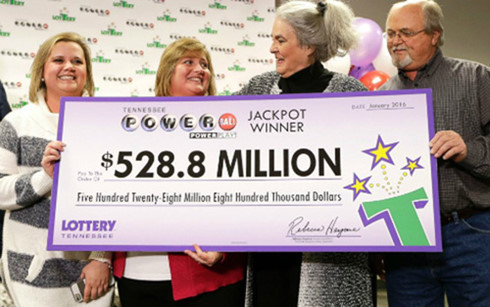How are lottery winners around the world taxed?
The 0% tax rate that a person in Tra Vinh province who just won a Vietlott lottery worth 92.02 billion VND must pay is much lower than the tax rates in the US and Europe.
>>>The old farmer's daughter in Tra Vinh is the new owner of the 92 billion lottery prize.
>>>10 biggest lottery wins in US history
>>> Horrifying tragedies after winning the lottery jackpot in the US
The largest ever Powerball jackpot, worth $1.6 billion, was split between four winners in the US in January 2016. However, with a series of taxes, the four winners will only be able to share just over $300 million.
 |
| Taxes on lottery winners in the US are the highest in the world. |
Even before taxes are applied, the prize is already somewhat diminished, according to CNBC analysis. The jackpot winner will only receive the full $1.6 billion if they choose to receive the money in 30 installments over 29 years. If they decide to take the lump sum, the prize will be cut by 38%, leaving them with $930 million. They will then be subject to federal taxes, with the highest tax bracket being 39.6%.
According to Melissa Labant, director of the American Institute of Certified Public Accountants, lottery winnings are taxed at a much higher rate than winners think. "There are not many ways to avoid taxes when you win the lottery. Lottery winners are not the ones the US government wants to exempt from taxes," said Ms. Labant.
For those who are citizens or permanent residents with Social Security numbers, the government automatically collects an additional 25 percent when claiming a prize at once. That's $232.2 million. If the winner doesn't have Social Security, the fee increases to 28 to 30 percent.
That's not counting the 14.6% personal income tax that person will have to pay to the tax agency in the April 2017 tax filing season. This tax is equivalent to $135.8 million. So, after all taxes and fees are deducted, the winner is estimated to be left with an amount of about $561.7 million. In fact, the prize is only $327.8 million before federal taxes - much lower than initially predicted.
In Europe, most countries do not tax lottery winnings. According to the EuroMillions website, which is played in 13 European countries, only three countries, Switzerland, Spain and Portugal, collect income tax from lotteries. Meanwhile, many people have become millionaires thanks to winning the jackpot and do not have to pay tax in France, England, Ireland, Austria and Germany.
The EuroMillions lottery only allows jackpots to be accumulated up to a maximum of 190 million euros. The jackpot has been won twice, in 2012 in the UK and 2014 in Portugal. However, anonymous winners in Portugal are taxed at 20%, so British couple Adrian and Gilian Bayford still hold the record for Europe's biggest lottery winners.
However, the UK has very high inheritance tax. Once the winner receives the prize money, it is automatically considered as their property and will be subject to inheritance tax at 40% for assets over £325,000. If the person gives the money to someone else, they will be subject to a floating inheritance tax rate of 20% if the donor dies 3-4 years after the gift and 0% if the donor dies within 4-5 years.
In Vietnam, the Vietnam Computerized Lottery Company Vietlott has determined that a person in Tra Vinh province won the jackpot prize of 92.02 billion VND. However, according to current Personal Income Tax regulations, this person must pay the entire winning amount exceeding 10 million VND multiplied by the tax rate of 10%, equivalent to 9.202 billion VND. Thus, Vietnam is among the countries that tax lottery prizes relatively low and at the same time do not collect inheritance tax when transferring assets between family members./.
According to VOV
| RELATED NEWS |
|---|

